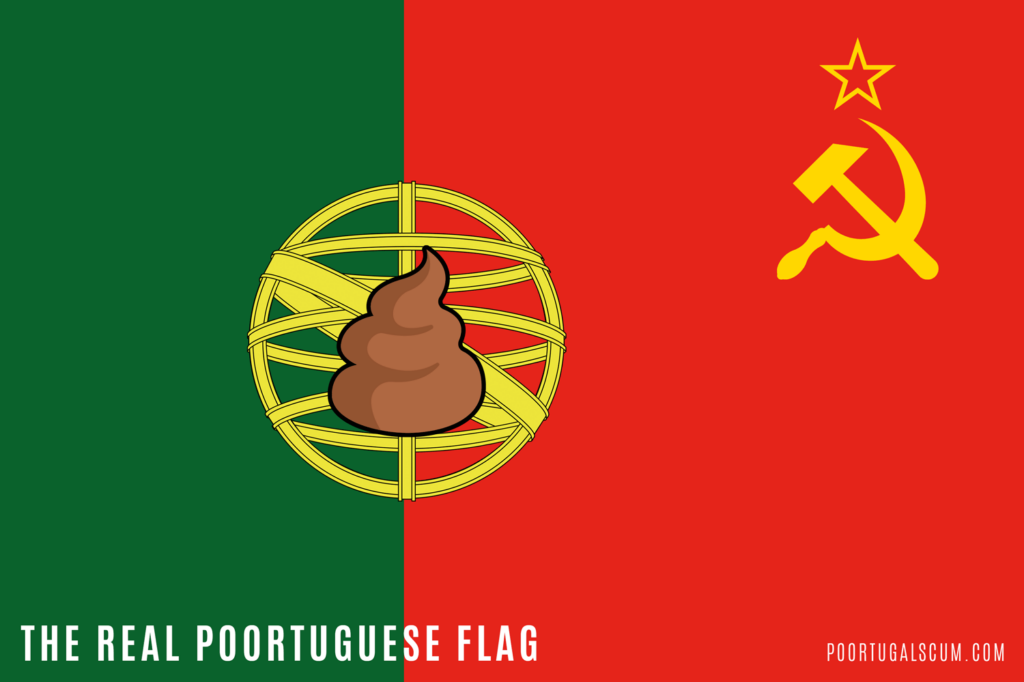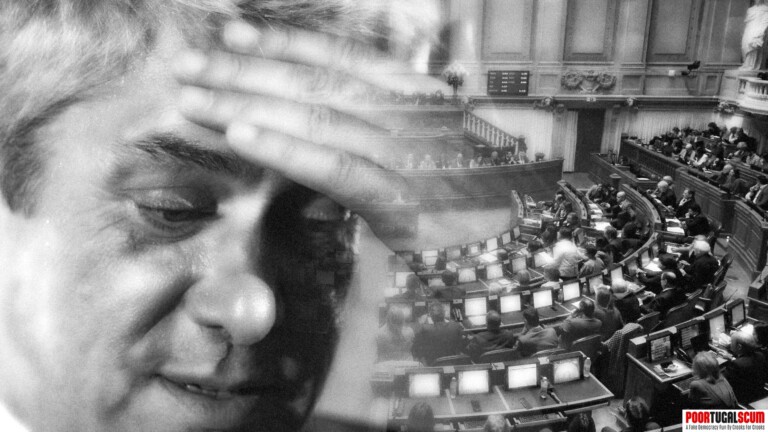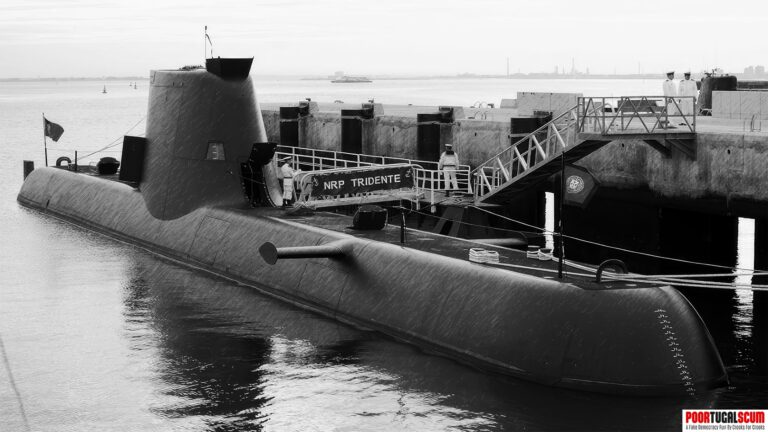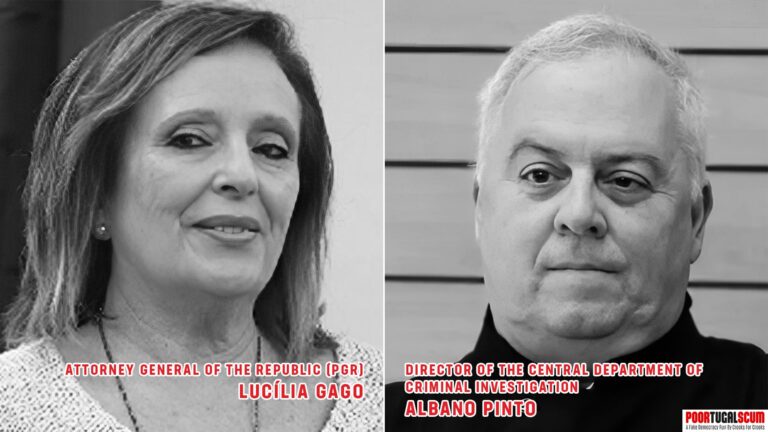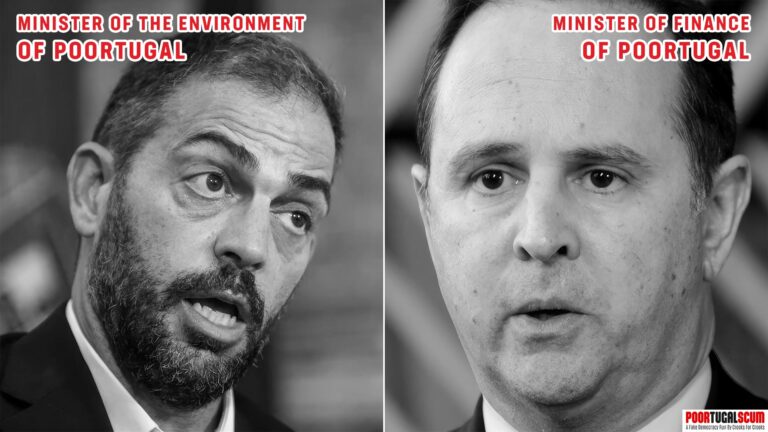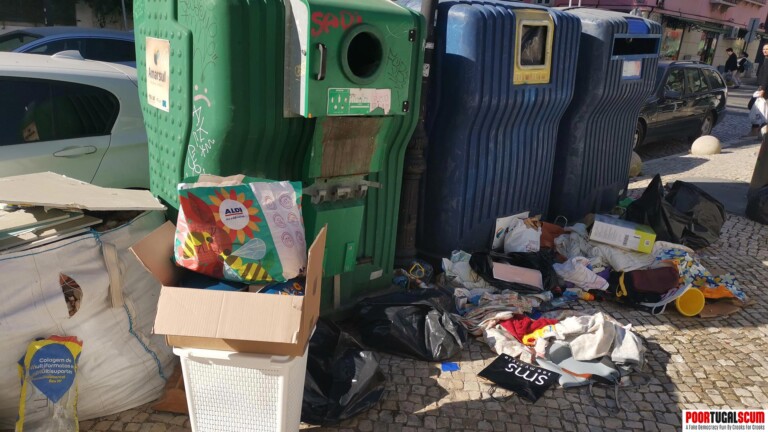The lame justification given by the party for these deposits was that they were donations collected at parties and dinners, and that the rush to deposit them on those end-of-year days was explained by the change in the party financing law, of which had just been made known to CDS officials. The receipts for all these deposits were also issued on dates after the deposits were made. Obviously, all of this makes no sense AT ALL and is highly compromising.
These serial deposits of cash into the accounts of this party are related to the lavish purchase of submarines by the Portuguese State, carried out by the then Minister of Defense, Paulo Portas, which in Portugal never went beyond the usual level of “suspicion” of corruption, and in which at the end of many fictitious investigations, all of which were discarded, the “suspected” politicians were, as always, cleared of any wrongdoing.
Quite the opposite of what happened in Germany and Greece, where the German company that sold the submarines to Portugal was actually convicted and confessed to having given 1.6 million euros to the Honorary Consul of Portugal in Munich. So no one in Portugal is asking where this money ended up? Of course not!
In Greece, the former Greek minister who received bribes from the same German submarine company was sentenced to 20 years in prison!
The then director of the DCIAP, Cândida Almeida, whose life story was to protect criminals from the various corrupt Portuguese governments, such as the former Prime Minister José Socrates, did not fail Paulo Portas either, clearing him with honors of the State of any illegal activity or even suspicion.
Portugal is such a disgusting and fake country run by criminals for criminals! When will the world realize this?
The following article is a translation (mostly MT). You can find the link to the original website at the end of it.
Amounts were justified as donations collected at parties and party dinners
The data appears in the final report of the investigation by the Judiciary Police (PJ) in the Portucale case,
which, however, concludes nothing regarding the origin of those amounts.
The episode was remembered yesterday by Paulo Portas, regarding the deal involving the purchase of submarines, noting that “it was also said that there was a deposit in the CDS accounts and Doctor Abel Pinheiro was acquitted at trial”.
Those amounts were justified as donations collected at parties and party dinners, which were stored in the coffers of the national headquarters. The hasty deposit during those end-of-year days was explained by the change in the party financing law, which came into force at the beginning of 2005 and whose content CDS officials had only been alerted to at that time.
As for the deal involving the purchase of submarines by the Portuguese State, this was finalized with the German consortium GSC (German Submarine Consortium) in April 2004 by the then Defense Minister Paulo Portas, and has been the subject of investigations, both in Portugal and Germany, on suspicion of corruption.
In the German case, the two accused managers decided to admit criminal action to obtain a suspended sentence, having said that they handed over the amount of 1.6 million euros to the honorary consul of Portugal in Munich. The latter, in turn, said before the German court that he held meetings with Minister Paulo Portas and Prime Minister Durão Barroso, to complete the deal.
Stressing that the 105 CDS deposits at BES were made between the 27th and 30th of December 2004,
“many of them at intervals of minutes and the vast majority in installments of 10 thousand euros”,
the PJ investigators also discovered that the receipts to justify the entry of those funds into the party’s coffers, they would all have been transferred on dates after the deposits. The books with the receipt books themselves would have been ordered in January 2005.
Other curious data are those relating to the identification of donors. Employees at the CDS national headquarters issued a total of 4,216 receipts, noting only the amount and the name of the donor, with the PJ noting that these were probably fictitious data, exemplifying the “sounding and anecdotal name of the donor” Jacinto Leite Capelo Rego”, worth 300 euros”.
Abel Pinheiro, then responsible for finances, and three other CDS employees were accused of falsifying documents. Last April they were acquitted, but the Public Prosecutor’s Office appealed to the Lisbon Court of Appeal.
More related news
MP says there is no evidence against Paulo Portas in the submarine case
Cândida Almeida, director of DCIAP, informed the leader of the CDS/PP today that “no evidence was collected of the practice of illicit acts of a criminal nature” by Paulo Portas “in the submarine process”, in a document to which Lusa had access.
“In response to the request, the DCIAP informs that the so-called ‘submarine process’ has its investigation opened against unknown parties,
and no evidence has been collected of the practice of an illicit act of a criminal nature on the part of Your Excellency (Paulo Portas)”, wrote Cândida Almeida, director of the Central Department of Investigation and Criminal Action,
in the document sent today to the Minister of Foreign Affairs who is traveling to Brazil.
According to sources close to the leader of the CDS-PP, Paulo Portas “following news published in the press about the “submarine case” requested on Monday, “under article 86 of the Criminal Procedure Code”, clarification to the DCIAP.
The same sources also mentioned that this is the “third time, in the last seven years, that the PP leader has requested clarification from the Public Ministry and it is the third time that the answer is the same”. Paulo Portas is in S. Paulo today and is traveling to Brasília this week to launch the Year of Portugal in Brazil.
The purchase of submarines by Portugal took place at a time when Paulo Portas was Minister of Defense and Durão Barroso, current president of the European Commission, prime minister of the PSD/CDS-PP Government.
The two “209 PN” submarines were delivered to the Portuguese Navy, which named them ‘Arpão’ and ‘Trident’, in a deal with an estimated cost of around 880 million euros for the Portuguese public coffers.
The investigation into the submarine business arose in the summer of 2006, based on a certificate from the Portucale process, relating to the construction of a tourist development in Benavente that would involve the illegal felling of cork oaks.
Listening to conversations involving the former financial director of the CDS-PP, Abel Pinheiro, the current leader of the party, Paulo Portas, and an administrator from Escom, from the Espírito Santos Group, raised doubts about alleged “commitments” with a view to favoring the consortium winner, in exchange for party financing.
Recently, DCIAP announced in a statement that new steps will be taken in the case of purchasing the two submarines purchased by the Portuguese State and that it will request the collaboration of the previous and current Minister of Defense, Paulo Portas [currently Minister of State and Foreign Affairs] and Aguiar Branco.
Last July, the DCIAP announced that it had archived the case whose “sole objective” was to investigate the actions of one of the lawyers (Bernardo Ayala) who represented the Portuguese State in the submarine business,
after concluding that there was “no evidence” of crime.
It was later discovered that several documents related to the submarine business and which were important for discovering the truth had disappeared from the Ministry of Defense.
Within the scope of the submarine dossier, there is a process related to counterpart operations and in which several defendants, Portuguese and German, have already been accused and pronounced guilty of the crimes of qualified fraud and document forgery.
Meanwhile, German justice has already sentenced two former executives of the German company Ferrostaal to two years in prison, with a suspended sentence, and to pay fines for bribing foreign public officials, in the sale of submarines to Portugal and Greece, but according to reports at the time the DCIAP, “the German decision in no way influences the ongoing investigations in the Portuguese inquiry”.
The Munich MP accused the two former Ferrostaal managers of having paid ‘gloves’ worth 62 million euros, between 2000 and 2003, to gain advantages over the competition and sell submarines to Greece and Portugal.
Ferrostaal, a defendant in the same case, acknowledged illegal practices and agreed to pay a fine of 140 million euros, which was only higher because the court took into account the company’s current precarious situation.
More related news
Paulo Portas removed from the cork oak case
The Lisbon Court of Appeal did not accept the Coimbra professor’s request for the CDS/PP leader to be named as a defendant.
Paulo Portas is definitively removed from the cork oak case, known as the Portucale process.
The Lisbon Court of Appeal rejected a request from professor Luís Sequeira (assistant in the process) to name the CDS/PP leader as a defendant.
The fact that Paulo Portas was never heard during the investigation (not even as a witness, which for the assistant was a “miracle”), led the judges to consider, in a ruling dated December 30th, that it was not “legally admissible to instruction requested against a person in relation to whom the investigation was not directed and who, therefore, did not see his possible criminal responsibility assessed by the Public Prosecutor’s Office in the order, indictment or archiving, which determined the closure of the investigation”.
More related news
20 years in prison for former Greek minister who received bribes in the submarine deal
The Athens court sentenced Akis Tsochatzopoulos to 20 years in prison for money laundering. At issue are military equipment contracts signed by the former Greek Minister of Defense between 1997 and 2001, including the one relating to the purchase of submarines from Germany.
After a five-month trial, it was proven that Tsochatzopoulos, co-founder of Pasok and former Minister of Defense, collected, between 1996 and 2001, 55 million euros in bribes with military equipment contracts, mainly with the purchase, from Russia, of a missile defense system and the acquisition of four submarines from Germany. The penalty imposed on him, however, only refers to the laundering of 6 million euros, as the politician could not be prosecuted for having accepted bribes, taking into account the legally established limitation period, and which is not applicable to the crime of money laundering.
After a five-month trial, the Athens court also found another 16 people guilty of being involved in this network of laundering money from bribes, including Tsochatzopoulos’ ex-wife, wife and daughter.
The co-founder of Pasok had already been sentenced in April 2013 to eight years in prison, a fine of 520,000 euros and the seizure of a luxury villa, for failing to justify the origin of the income with which he acquired that property, in a scheme considered “fraudulent” by the court.
Due to his age, Tsochatzopoulos, 74, will only serve part of his sentence.
The administrators of MAN Ferrostaal, the company that bribed Akis Tsochatzopoulos, had already confessed to the German court that they had also sent gloves to political leaders in Portugal,
but no one was charged, much less arrested in our country.


